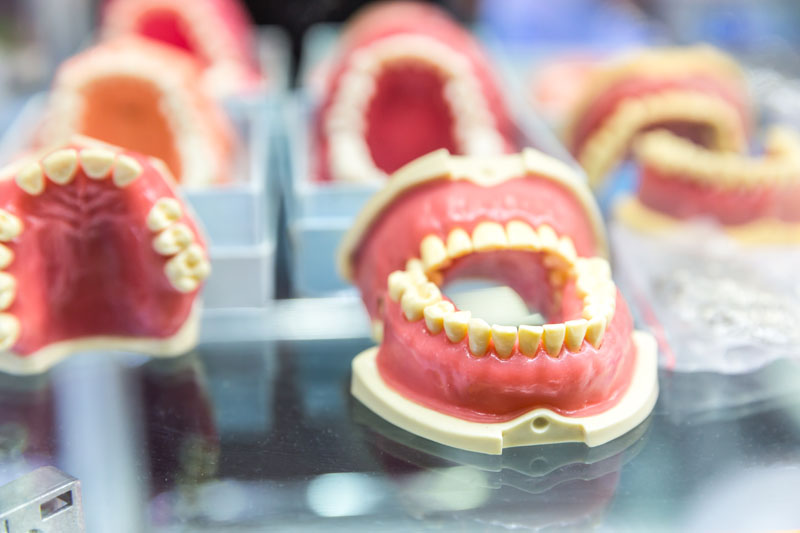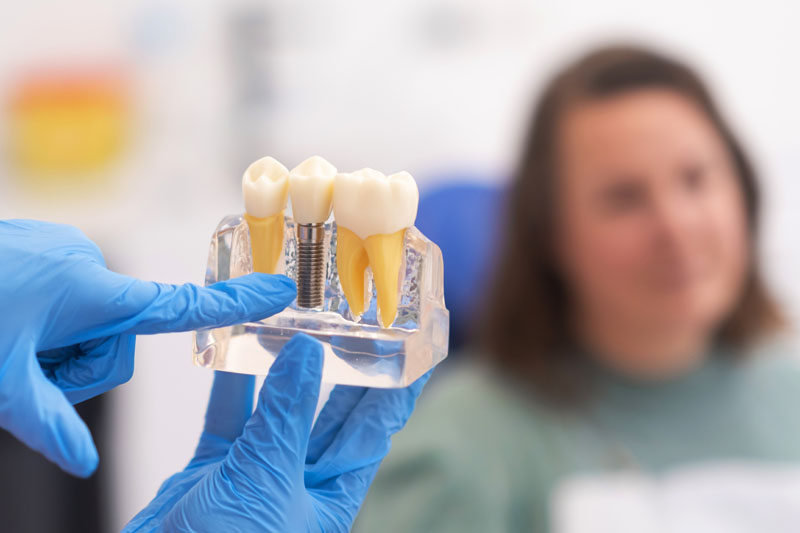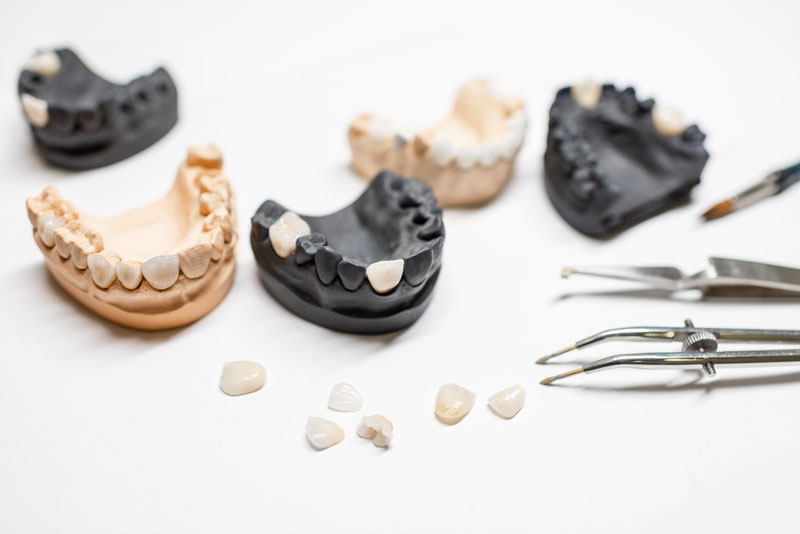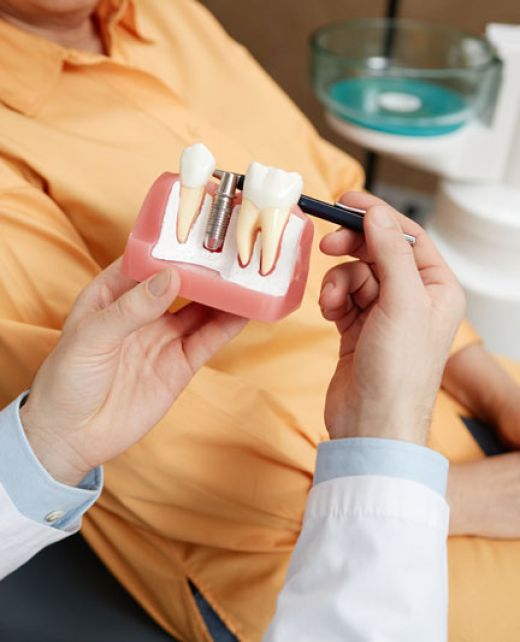What are a Dental Implants
Restore Your Smile with Our Dental Implants
Dental implants, the perfect solution to replacing missing or critically damaged teeth, have entirely transformed the dentistry landscape over the last decade.
With their titanium post, which is surgically embedded in the jaw, dental implants function as an artificial replacement for the root of your tooth. They can be fitted with a crown or fixed with further cosmetic restoration to transform your smile.
Dental implants can also support loose dentures, securing them firmly in place. However, dental implants are only appropriate under certain circumstances. The benefit of having dental implants fitted is simple: you can achieve cosmetic and functional results with an appearance comparable to natural teeth. Dental implants are a well-established, tried and tested treatment. 90% of modern implants last for at least 15 years.
Once the implant is fitted, patients can expect an appropriate healing period, known as osseointegration, before enjoying that pristine smile and functional use for years to come. Treatment is generally undertaken under local or general anaesthetic, with patients able to return home once the dental implant has been fitted.
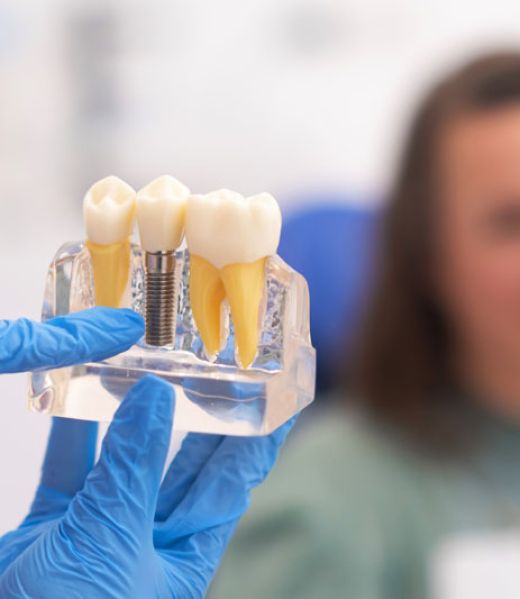

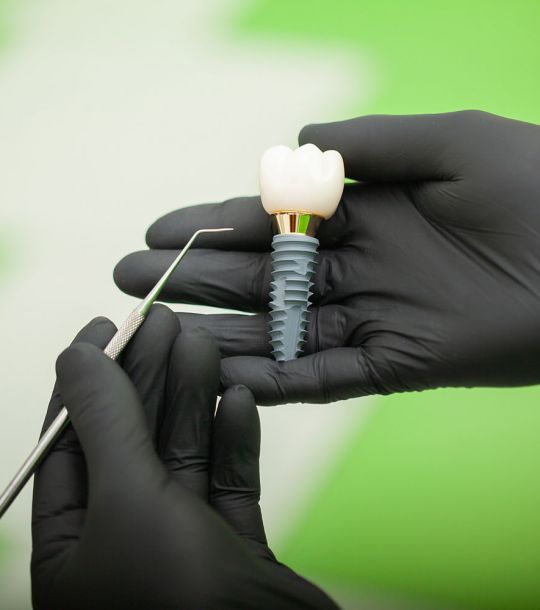
Am I a candidate for Dental Implants?
- A robust jawbone is crucial, as it will support the implant. The mandible and maxilla must be healthy to ensure the implant has a solid foundation.
- Healthy gums are necessary, with no significant or uncontrolled bleeding issues.
- Your bone growth should be complete, making this treatment more suited to adults.
- You should be free from medical conditions that increase the risk of surgical complications. This includes but is not limited to uncontrolled diabetes, untreated heart conditions, unpredictable high blood pressure, and active gum disease.
Dental Implant Procedure
At the outset of our dental implantation process, we engage in a thorough discussion with our patients. This involves reviewing their medical and health histories, including any medications and illnesses, assessing potential risk factors, and conducting a detailed dental examination.
To accurately model the patient’s jaw and teeth, we utilise three-dimensional imaging and X-rays. Our dental surgeons collaborate closely with various specialists to formulate a precise treatment plan. This includes working with an ENT (Ear, Nose, and Throat) doctor if the implantation might affect these areas, consulting a periodontist to assess the health of bones and gums, and coordinating with a prosthodontist for the preparation of the dental appliance.
We present the treatment plan to our patients, offering them a choice between local or general anaesthesia. Post-procedure, patients are typically able to return home.
If the patient consents to the treatment plan, we proceed with the surgery:
Our dental surgeon ensures the patient’s comfort throughout the implantation. The procedure involves making an incision in the gum to access the jawbone, followed by drilling a hole to fit the implant. After placing the implant, we focus on promoting wound healing and osseointegration – the integration of the implant with the bone. A temporary denture is used to cover the area, aiding in quicker healing.
This phase, often spanning several months, allows for complete osseointegration, ensuring the implant is firmly anchored.
Once osseointegration is achieved, the patient returns for a minor procedure. The surgeon exposes the implant to attach an abutment, which protrudes slightly above the gum line, ready for the artificial tooth. Some patients prefer to have the abutment installed immediately after the implantation, although this means having a visible metal post during the healing period.
The final step is the installation of the artificial teeth. Patients can choose between fixed or removable options, bringing them closer to regaining their smile. Throughout each stage, we ensure our patients are fully informed and comfortable with the process, leading to a successful and satisfying outcome.
What Types of a Dental Implants
When it comes to dental implants, you have a couple of primary options to consider, each differing in placement technique to accommodate various dental needs:
• Endosteal Implants
Regarded as the conventional choice, endosteal implants are surgically inserted directly into the jawbone. They are the go-to solution for those with a healthy and robust jawbone, providing a stable and long-lasting foundation for the replacement teeth.
Each type of implant offers a tailored approach to dental restoration, ensuring a way to regain a full and confident smile regardless of your jawbone condition.
If you’re under the impression that dental implants are a product of the 21st century, prepare to be intrigued by a snippet from history. The ancient Mayans were pioneering dental innovators, embedding tooth replacements into jawbones as early as 600 AD. Fast forward two hundred years, and they had enhanced their techniques, swapping out shell materials for stones to increase the durability and strength of these early implants.
In the modern era, dental professionals have turned to advanced materials like titanium oxide to craft these prosthetics, prized for its compatibility with the human body. While titanium remains a popular choice, there’s also a growing preference for alternatives such as zirconium oxide, known for its aesthetic qualities and strength. Others may choose gold alloys, ceramics, or cobalt-based alloys, each offering unique benefits and options for personalized dental care.
According to the Department of Health of Ireland, 56% of Irish adults have missing teeth, indeed, the prevalence of edentulism, or tooth loss, tends to be much higher in the older population compared to the younger demographic. Statistics indicate that a staggering 96% of individuals over the age of 75 experience some degree of tooth loss, while only 12% of young adults between the ages of 15 and 24 are affected. This suggests that the likelihood of losing teeth—and consequently the potential need for dental implants or other tooth replacements grows as we age.
However, it’s not a one-size-fits-all situation. Here at Galway Dentists, we understand that each smile is unique, so we offer various teeth replacement options tailored to individual needs and circumstances. Whether it’s dental implants, bridges, or dentures, our goal is to restore functionality and confidence to your smile, regardless of age.

Open Hours
- Mon-Fri: 9 AM – 6 PM
- Saturday: 9 AM – 4 PM
- Sunday: Closed
-
Excellent and very professional dental care. Dentist put me at ease and talked me through the procedure. Would definitely recommend to others.
Ciara Mc Bride
January 19, 2016 -
I've been going here since the start of September 2016, and I have to say it is one of the best dentists around. Very professional and friendly, as well as a relaxing atmosphere to the place, they have never let me down. The staff are delightful and Michael is an incredible dentist. Would recommend to anyone.
Matthew Ferson
January 19, 2018 -
I visited Dentist Michael Donnelly this week. As I am someone who is nervous about visiting the dentist I was not looking forward to seeing Michael at all , but to my surprise he was extremely helpful and made the experience easy and painless. Michael and his dental nurse were very polite and I am looking forward to my next dental visit.
Sean Moran
January 19, 2018 -
I had a very pleasant experience at Galway Dentists, the receptionist was friendly and welcoming and the the dentist and her assistant were so professional and offered great advice. Thank you so much, I can't stop smiling with my shiny white teeth ????
Arthur Gray
January 19, 2022
What Are the Benefits of Dental Implants?
If you’re deemed suitable for dental implants, they can bring a host of advantages into your life, such as:
A beaming, gap-free smile that you’ll be proud to show off at any opportunity. A genuine smile is a powerful tool that can dissolve social barriers, enabling you to connect more easily with others, whether they’re close friends or new acquaintances.
An elevation in social confidence that can transform your interactions and relationships. With the renewed self-assurance that comes from a complete smile, you might find yourself forging deeper connections, and you could even find it easier to secure rewarding job opportunities in Ireland, where a friendly smile is often seen as an asset.
The freedom to indulge in all your favourite foods, no matter how tough or sticky they may be. With the robust support of Galway’s dental implants, you can enjoy a hearty steak or crunch on crisp vegetables without concern for your dental work.
A rejuvenated appearance, as dental implants help prevent the sagging of facial muscles, maintaining the natural contour of your face and potentially giving you a more youthful look.
Improved Oral Health: Unlike other tooth-replacement options, implants do not require altering adjacent teeth, which preserves more of your natural tooth structure. Additionally, implants help prevent bone loss in the jaw and can help maintain the alignment of surrounding teeth.
Alternative Treatment Options
Book a consultation today with one of our team, who will be happy to discuss these options with you in-depth
Dental Implant FAQ
Placing the dental implants requires a small operation. This can be carried out under
local anaesthetic with sedation or with a general anaesthetic. You will not feel any pain
at the time, but you may feel some discomfort during the week following the surgery.
It takes about 12 months from the initial assessment to the time when the artificial
teeth or dentures are finally attached to the implants. A lot depends on how
complicated your treatment is.
Cleaning around the teeth attached to the implants is no more difficult than cleaning
natural teeth.
Yes, if you don’t clean them well enough. If you keep them clean and don’t smoke then
you should not have any problems.
Your dentist will make sure that the implants won’t show during all normal movements
of the mouth or lips.
This happens very rarely. This is usually discovered at the second stage surgery when the implant is uncovered and the surgeon finds it has not bonded with the jaw bone and is loose. In this case, the “failed” implant has to be removed. In these cases, the dental implant can easily be removed, and the jaw will heal in the normal way. Once the jaw has healed, another implant can normally be placed there. Or in cases when
multiple implants have been done; the dentist can make a bridge using the other implanted false teeth that have been “taken”.
Book a Consultation Today
Dental Implant Prices

-
Dentures - Partial Acrylic (Plastic) based Dentures from €450
-
Dentures - Full Acrylic (Plastic) Upper or Lower €1000
-
Dentures - Cobalt Chrome (Metal) based Dentures €1,400
-
Denture - Adjust From €40
-
Dental Bridge from €800
(per unit / tooth)
-
Dental Implant - Implant Consultation from €85
-
Dental Implant - Implant Placement From €1,350
-
Dental Implant - Grafting €450 – €650
(per grafting site)
-
Dental Implant - Implant Crown From €1,350
(3-4 months after Implant Placement)





